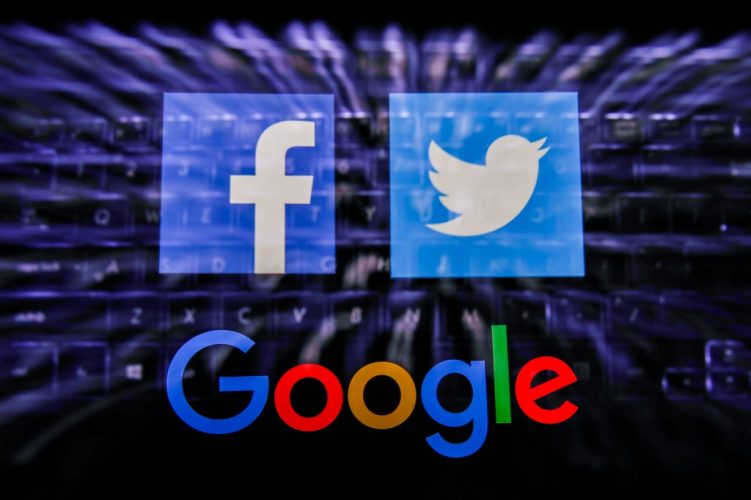Big Tech, its hands full with antitrust probes and complaints growing from activists and politicians, turns its attention to quarterly earnings in the coming days expected to show the growing power of Silicon Valley giants.
The results may be overshadowed by the array of political and policy issues over privacy, data protection, liability and the dominant role of these companies in the economy.
Amid the coronavirus pandemic, Big Tech has offered a lifeline to consumers to stay connected and get needed goods and services.
Tech firms “have built up some goodwill and people are thankful for these services,” said Bob O’Donnell of Technalysis Research.
Big tech firms “were the only institutions that didn’t seem to fail” during the pandemic, said Chris Meserole, deputy director of the Brookings Institution’s Artificial Intelligence and Emerging Technology Initiative.
A Brunswick Group survey of consumers in seven countries in May found 70% of Americans and 65% of Europeans agree that “technology companies have used their size and influence for good in the fight against Covid-19.”
Calls for more regulation
But at the same time, three in four of those surveyed said governments “should be more active in regulating technology companies.” This is up 14 points in the US since 2018, and largely unchanged among Europeans.
Big Tech has helped lift stock values, with the Nasdaq hitting several record highs: Amazon shares have nearly doubled from March lows while Apple and Alphabet have gains some 50%.
Economist Ed Yardeni noted that six leading tech firms – Apple, Microsoft, Amazon, Google parent Alphabet, Facebook and Netflix – had a collective market value of $6.5 trillion in early July, or a record 25% of the Standard & Poor’s 500 largest companies.
Profiting from crisis?
These Big Tech firms “are among the biggest beneficiaries of the economic upheaval caused by the (pandemic) and are likely to continue to benefit from its aftershocks well after the crisis is over,” Yardeni said in a research note.
“That’s because their businesses are internet-based, so the more that people’s work, education, and entertainment are home-based, the more these businesses thrive.”
Quarterly results this week from Microsoft and next week from Amazon, Apple, Alphabet and Facebook will offer more clues on how the sector is faring in the pandemic.
Amid a struggling economy, Amazon looks to have boosted its position in e-commerce while expanding cloud computing while Apple has been growing its range of services.
Ad boycott
Other tech giants appear to be largely weathering the crisis, and growing in some cases, even if Facebook is the target of a growing advertiser boycott seeking more aggressive action on hateful content.
The spotlight is likely to be on an unprecedented antitrust hearing Monday in Congress featuring the top executives of Apple, Amazon, Facebook and Google.
Also looming are the outcomes of federal and state antitrust investigations into major tech platforms which could mean fresh legal battles.
Daniel Ives of Wedbush Securities sees “a potentially rocky road ahead” and that “the overhang of regulatory scrutiny remains a lingering worry” for Amazon, Google, Apple, and Facebook.
“Momentum is building in the Beltway on this hot button antitrust issue,” Ives said in a note to clients.
More battles
Tech firms face additional pressure including the Trump administration’s effort to enable law enforcement access to encrypted content and devices.
Officials say better access is needed to fight crime and exploitation, but the companies argue that proposed measures could weaken online security for everyone.
Trump and his allies argue that big social platforms are biased against conservatives, despite his large following. At the same time activists have pressed the companies to be more aggressive in removing incendiary content and misinformation, including from Trump, and 1,000 advertisers have joined a “Stop Hate for Profit” boycott of Facebook.
Meserole said that because of its failure to take action on hateful content, “all the goodwill Facebook had built up in the immediate aftermath of the pandemic went out the window.”
He said firms such as Apple and Google have remained “good corporate citizens” during the crisis, noting efforts to improve technology for contact tracing.
Lawmakers from both parties have called for changes to a law known as Section 230 which shields online services from liability from content posted by others – which some analysts say could have a devastating impact.
O’Donnell said recent events have shown the power and influence of the Big Tech firms and that “there’s clearly going to be more scrutiny, and deservedly so.”
But Meserole said that despite the noise on antitrust, breakups are unlikely without legislative changes which could take time.
“Without that shift in regulatory approach, all that’s likely to happen are a series of large fines, rather than a breakup of Big Tech,” he said.
AFP
























